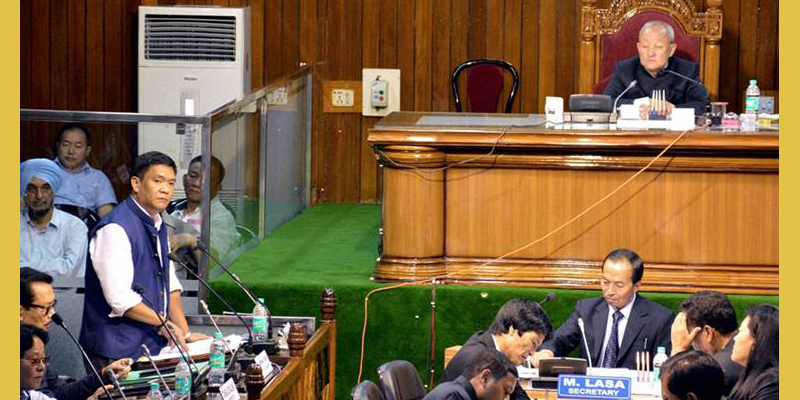Tibetan Rehabilitation Policy adopted by Arunachal Pradesh state assembly today after the Parliamentary affairs minister, Bamang Felix moved it in the assembly. The Tibetan Rehabilitation Policy 2014 was strongly protested by several student groups in the state and the assembly today adopted to implement the policy in the state.
“This Assembly is of the opinion that the State Govt. do take steps to implement the Tibetan Rehabilitation Policy, 2014 after due consultation with all stakeholders and do so by taking steps to protect the territorial and other consequential rights of its tribal population as protected and guranteed under the constitution of India and other relevant laws enforce in the state.” said the assembly after a strong debate on the floor.
Felix said that he had earlier moved the resolution that the state government should implement the policy after due consultation with all stakeholders. He also informed the house that the adoption of the policy is necessary as this will help in protecting the territorial and other rights of tribal populations as protected and guaranteed under the Constitution of India.
In response to the move brought up by the Parliamentary Affairs Minister, the Chief Minister of Arunachal Pradesh said that the Tibetan refugees are peace-loving people who have co-existed with locals peacefully while their numbers have also been decreasing in the state.
“Unlike other refugees like the Chakma and Hajongs who are seeking citizenship and other rights and creating law and order problems and their numbers are increasing, the Tibetans are peace-loving and law-abiding people and have been peacefully co-existing with locals. Their numbers too are decreasing,” CM Shri Pema Khandu said in the state assembly“The policy will also help in drawing a border line which will protect the rights and interests of the tribal people,” he added.
“The policy will not only benefit the Tibetans but will also safeguard the rights of the tribal people of the state as it will demarcate their status as a result of which they cannot encroach upon the rights of the indigenous people in the future,” Khandu said. “We want that refugees should stay in the state with refugee status so that in future they cannot claim ST status,” the chief minister said adding, the resolution itself proved the intention of the government while he also cleared that the government is ready not to implement it if the stakeholders say so.
Arunachal Pradesh has three Tibetan settlements; Tenzingaon in West Kameng district, Tezu in Lohit and Miao in Changlang district with a population of 7530. The Tibetan Rehabilitation Policy 2014 framed by the Central Government of India and the Policy guideline makes a uniform policy statement to all Tibetan refugees in the country that they may be allowed to undertake any economic activity and to that extent, relevant papers/trade license/permit may be issued to them. The policy also says that Tibetan Refugees may also be permitted to pursue/take jobs in any field for which they are professionally qualified. These could be fields like nursing, teaching, Chartered Accountancy, medicine, engineering etc.
Note: Image is just for representation







Leave a Reply